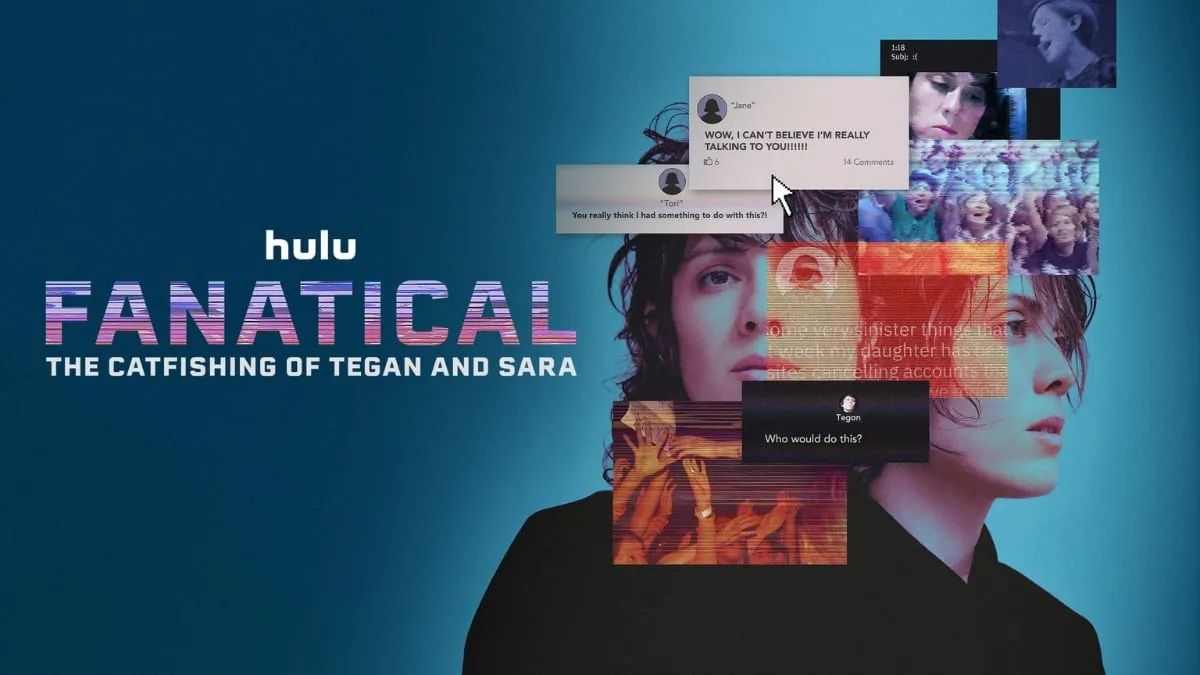
In June 2011, fans of Tegan and Sara’s social media accounts, myself included, were alarmed to receive a concerning announcement from the band’s management. It was disclosed that for over two and a half years, someone had been misleadingly communicating with individual fans while impersonating Tegan Quin, one half of the acclaimed queer indie-pop duo known for forging close connections with their audience in the early 2000s.
Since that incident, Tegan and her twin sister, Sara Quin, have refrained from publicly addressing what they privately identified as “Fake Tegan” or “Fegan” —until now.
The Hulu documentary *Fanatical: The Catfishing of Tegan and Sara*, directed by Erin Lee Carr and co-produced with music journalist Jenny Eliscu and filmmaker Elyssa Hess (known for *Harry & Meghan*), delves into a catfishing scandal that not only shocked the Tegan and Sara fandom but also disrupted the lives of the sisters, their loved ones, and even casual acquaintances. The film traces the investigation’s evolution, offering insights into how the situation has unfolded over the past 15 years. (Yes, it’s true.)
After the release of their 2004 album *So Jealous*, Tegan and Sara quickly captured the hearts of the indie music scene, becoming favorites due to their candidness about their queerness. Their commitment to engaging with fans through lengthy conversations at merchandise tables and by their tour buses fostered a unique bond with their audience. Sadly, as shown in *Fanatical*, this trust was exploited by at least one individual who targeted and deceived hundreds of fans globally over a span of more than 15 years.
The documentary features interviews with several of Fegan’s victims, as well as insights from Tegan, Sara, their former managers Piers Henwood (2002-2020) and Kim Persley (2004-2019), co-producer Eliscu, Tegan’s ex-girlfriend, photographer Lindsey Byrnes, and Tegan’s tattoo artist, Rene Botha. Director Carr seeks to unravel how Fegan gathered extensive personal information about the Quin sisters and manipulated it. Persley observes that during the early 2000s, internet security was notably lacking: “It was the wild west” of online interactions.
Through hacking personal emails and at least one hard drive, Fegan fabricated numerous false identities on platforms like Facebook and Last.fm. They cultivated friendships with fans, sharing thousands of emails and text conversations that included personal images, unreleased demos, genuine passport scans, and sensitive details about Tegan’s family—like her mother’s breast cancer diagnosis—under the guise of forming genuine connections, some even turning sexual.
*Fanatical* unfolds mostly in chronological order, presenting the evidence as it was discovered by Tegan and Sara’s team and the documentary crew. Unlike the sensationalism found in MTV’s *Catfish*, this film portrays a profoundly human narrative about a public figure whose identity was manipulated to exploit primarily young, queer women. Although Sara expressed temporary concerns about their identities being misappropriated financially, Fegan’s true intentions were more chilling. They successfully convinced numerous fans that they were communicating with the authentic Tegan Quin, often portraying a controlling and abusive version of the artist.
At one point, Fegan even initiated a rapport with one of Tegan’s real-life acquaintances, emphasizing the depth of the deception and its consequences. Alarmingly, the timeline showcased in the documentary indicates that similar impersonations might still be occurring, as Tegan’s testimony mentions that this remains a pressing issue. One principal reason for Tegan and Sara’s silence on the matter since the initial 2011 announcement was their concern that speaking out would exacerbate the situation.
“As soon as we received the approval for this project, I regretted it immediately,” Tegan reveals in the opening of *Fanatical*. “I actually feel that way now. This will undoubtedly make many uncomfortable. It puts our fanbase under scrutiny. I dread the possibility of wrongly accusing someone. I had to challenge years of instinct telling me that discussing it would worsen the problem. Yet, I can’t cease contemplating it. Someone can still impersonate me. They continue to do so. I just want clarity on what transpired.”

Multiple individuals featured in *Fanatical*, including Tegan, express how the revelation of Fegan shattered their trust in those around them. Several recounted their struggles to enjoy Tegan and Sara’s music after realizing the person they had formed connections with was not actually Tegan. The film poignantly underscores the profound violation entrapped in being a catfishing victim, highlighting the distressing experience of identity theft in this context.
Moreover, as suggested by the title, *Fanatical* dives into the darker side of fandom, exploring the disturbing phenomenon of fans branding themselves as “stans” —a term originating from Eminem’s song that combines “stalker” and “fan.” The documentary illuminates how celebrity obsessions can evolve into unhealthy fixations. The concept of parasocial relationships, which was not prevalent when Tegan and Sara first emerged, took on new meaning after the exposure of Fegan. The band subsequently felt the need to alter their approach to fan interactions to regain a sense of security.
As part of their response to their growing popularity, they began implementing VIP ticketing to streamline fan interaction as a precaution. Longtime fans who had previously established connections felt hurt and resentful by this sudden change, particularly since it was not adequately addressed. After watching *Fanatical*, I found myself reevaluating my responses to similar transformations within bands I loved before they gained popularity, contemplating whether safety concerns were at the heart of such transitions.
Viewing this documentary as an early supporter of Tegan and Sara was a surreal experience, particularly because I was once taken aback by that 2011 announcement, which left me seeking answers that were hard to come by. The initial discovery of Fegan serves merely as a prelude; the intricate web of deception spans over 15 years as revealed in the film. Carr and the production team excel in navigating this complex narrative, though some fans may feel they leave wanting more at the finish line. Understandably, restraint is crucial given this sensitive subject, but the expectation for comprehensive detail from a richly produced documentary often looms large. Fans hoping for every sordid detail in *Fanatical* may find themselves disheartened, but they will likely come away with a better understanding of the situation.
*Fanatical: The Catfishing of Tegan and Sara* is available to stream on Hulu now.




Leave a Reply